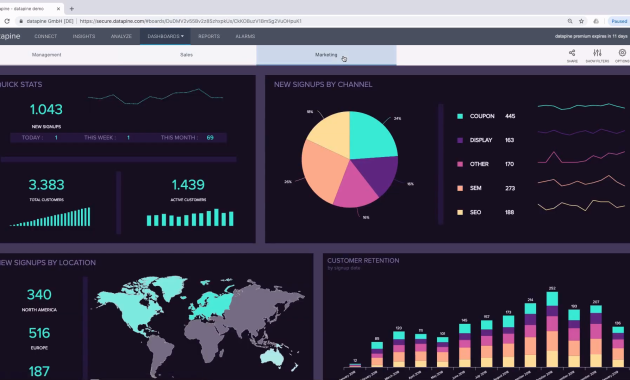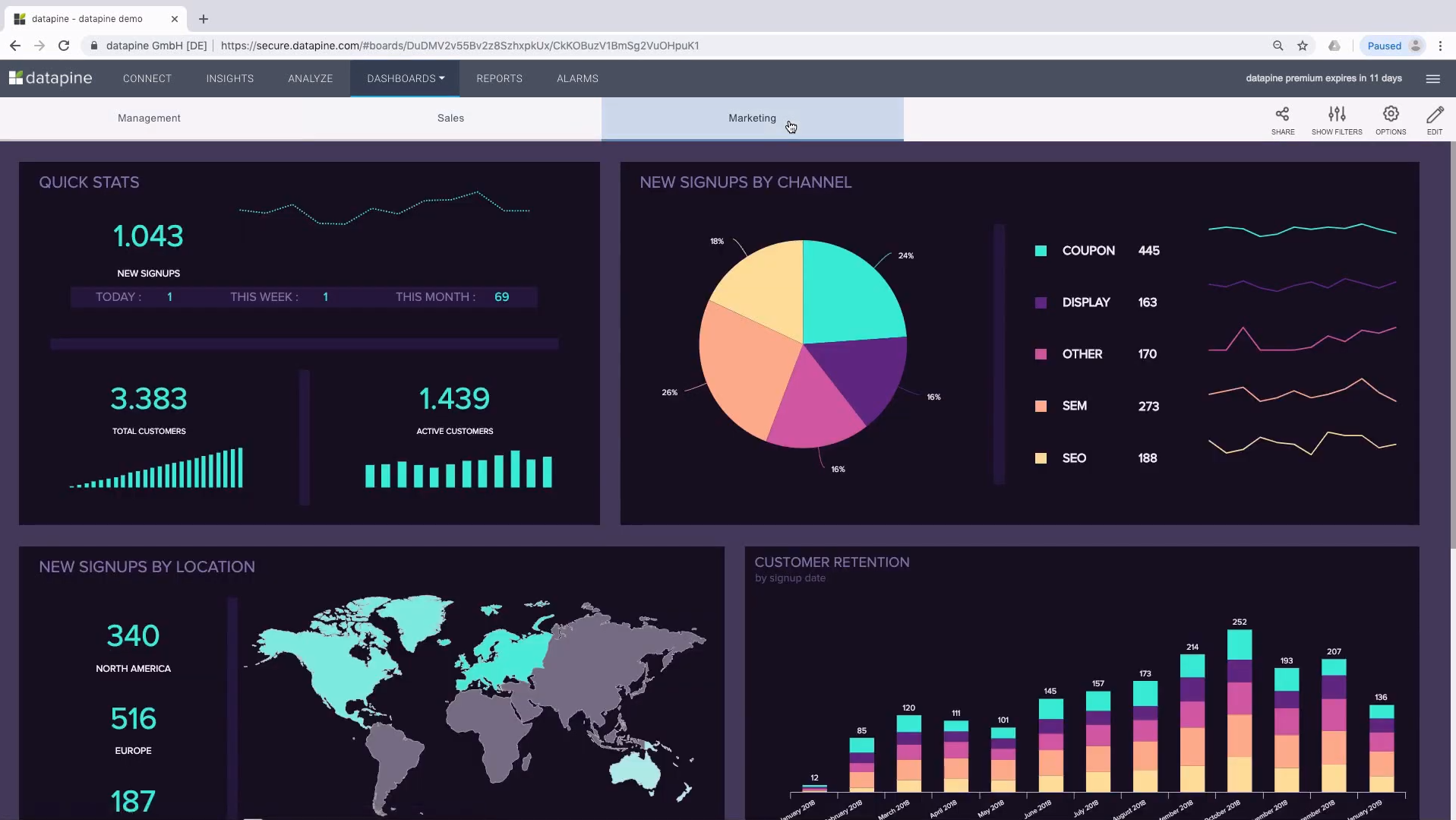
Business Intelligence Software That Works Right Now: Your Guide to Data-Driven Decisions
In today’s fast-paced business environment, data is king. The ability to collect, analyze, and interpret data can make or break a company. This is where business intelligence (BI) software comes into play. It’s more than just a buzzword; it’s a critical tool for organizations seeking a competitive edge. This guide provides a comprehensive overview of business intelligence software that works right now, helping businesses make informed decisions and achieve their goals.
The need for robust business intelligence software has never been greater. Companies are drowning in data, but often struggle to extract meaningful insights. Business intelligence software provides the tools to transform raw data into actionable information. This empowers businesses to understand trends, identify opportunities, and mitigate risks.
Understanding Business Intelligence and Its Importance
Business intelligence encompasses the strategies and technologies used for data analysis. It involves collecting, integrating, analyzing, and presenting business information. The goal is to support better decision-making. This is done by providing users with the right data at the right time. Effective business intelligence leads to improved operational efficiency, enhanced customer satisfaction, and increased profitability.
The benefits of business intelligence are numerous. Organizations can gain a deeper understanding of their customers, markets, and competitors. They can optimize their operations, improve their forecasting capabilities, and identify areas for cost reduction. Business intelligence enables data-driven decision-making, replacing guesswork with evidence-based strategies. This is why choosing the correct business intelligence software is crucial.
Key Features to Look for in Business Intelligence Software
Not all business intelligence software is created equal. Different software packages offer varying features and capabilities. When evaluating business intelligence software, consider these key features:
- Data Integration: The ability to connect to various data sources, including databases, spreadsheets, and cloud services.
- Data Visualization: Intuitive dashboards and reports that present data in an easy-to-understand format.
- Data Analysis: Advanced analytical capabilities, such as statistical analysis, predictive modeling, and data mining.
- Reporting and Dashboards: Customizable reports and dashboards that provide real-time insights into key performance indicators (KPIs).
- User-Friendly Interface: An intuitive and easy-to-use interface that allows users to access and analyze data without requiring extensive technical skills.
- Scalability: The ability to handle growing data volumes and user needs.
- Security: Robust security features to protect sensitive data from unauthorized access.
- Mobile Accessibility: The option to access dashboards and reports on mobile devices.
Top Business Intelligence Software Solutions Available Now
Several business intelligence software solutions are currently available. Each offers unique strengths and caters to different business needs. Here’s a look at some of the leading options:
Tableau
Tableau is a leading business intelligence software known for its user-friendly interface and powerful data visualization capabilities. It allows users to create interactive dashboards and reports. It also connects to various data sources. Tableau is suitable for businesses of all sizes. It offers robust features for data analysis and sharing.
Microsoft Power BI
Microsoft Power BI is a comprehensive business intelligence software solution. It integrates seamlessly with other Microsoft products. Power BI offers a wide range of features. These include data modeling, data visualization, and collaboration tools. It is a cost-effective option for businesses already invested in the Microsoft ecosystem. Power BI is a powerful and flexible BI tool.
Qlik Sense
Qlik Sense is a self-service business intelligence software. It uses an associative data model. This allows users to explore data from different angles. Qlik Sense offers advanced analytics capabilities and supports data storytelling. It is suitable for businesses looking for a flexible and intuitive BI platform.
Looker
Looker is a business intelligence software platform. It focuses on data modeling and data governance. Looker allows businesses to define metrics and create a single source of truth. It is useful for organizations with complex data needs. Looker offers robust features for data exploration and collaboration.
Sisense
Sisense is a business intelligence software platform. It focuses on providing insights. It supports various data sources and offers in-memory data processing. Sisense provides fast performance. It also features advanced data visualization. It is suitable for businesses with large datasets and demanding analytical needs.
Choosing the Right Business Intelligence Software for Your Needs
Selecting the right business intelligence software requires careful consideration. The best choice depends on factors. These include the size of your business, your specific needs, and your technical expertise.
Here’s a step-by-step guide to help you choose the right software:
- Assess Your Needs: Define your business goals and identify the key metrics you need to track.
- Evaluate Your Data Sources: Determine the data sources you need to connect to.
- Consider Your Budget: Set a realistic budget for software and implementation costs.
- Evaluate Software Options: Research the available business intelligence software solutions and compare their features.
- Request Demos and Trials: Test the software with your data to evaluate its usability and functionality.
- Consider Support and Training: Ensure that the vendor offers adequate support and training.
- Plan for Implementation: Develop a plan for implementing the software and integrating it with your existing systems.
The Future of Business Intelligence Software
The field of business intelligence is constantly evolving. New technologies and trends are shaping the future of the industry. Key trends include:
- Artificial Intelligence (AI) and Machine Learning (ML): AI and ML are increasingly being integrated into business intelligence software. They automate data analysis and provide predictive insights.
- Cloud-Based BI: Cloud-based BI solutions offer scalability, flexibility, and cost-effectiveness.
- Self-Service BI: Self-service BI empowers business users to access and analyze data without IT intervention.
- Data Governance: Data governance is becoming increasingly important. This ensures data quality and compliance.
- Mobile BI: Mobile BI allows users to access data and insights on the go.
Business intelligence software is a powerful tool. It can help businesses make better decisions. It can improve their performance. By choosing the right software and leveraging its capabilities, organizations can gain a competitive advantage and achieve their goals. The right business intelligence software empowers data-driven decision-making.
Conclusion: Making Data-Driven Decisions with the Right Software
Selecting the right business intelligence software is a strategic investment. It enables businesses to unlock the full potential of their data. By understanding their needs, evaluating software options, and staying informed about industry trends, organizations can make data-driven decisions. These decisions drive growth and success. The business intelligence software solutions available today offer a wide range of features. These features empower businesses of all sizes. They can transform raw data into actionable insights. This information empowers them to thrive in today’s competitive landscape. Businesses that embrace the power of business intelligence are well-positioned for success. They are able to make better decisions. They can improve their operations. They also can achieve their strategic goals.
[See also: Benefits of Business Intelligence for Small Businesses]
[See also: How to Choose the Right BI Tool for Your Company]
[See also: The Future of Business Intelligence: Trends and Predictions]

